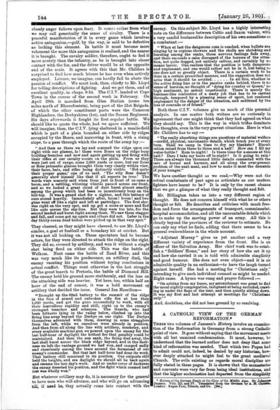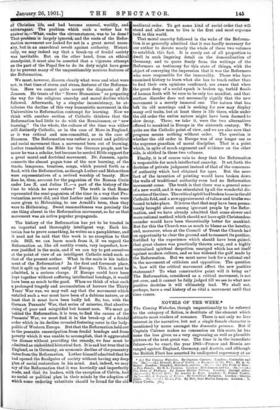A CATHOLIC VIEW OF THE GERMAN REFORMATION.*
THESE two volumes of Janssen's History involve an examirno tion of the Reformation in Germany from a strong Catholic point of view. It goes without saying that the movement meets with all but unmixed condemnation. It must, however, be understood that the learned author does not deny that some kind of reformation was needed. That which two Popes had to admit could not, indeed, be denied by any historian, how- ever deeply attached he might feel to the great inediseval Church. The evils existing as regards moral discipline are fully stated in these pages. It is shown that the monasteries and convents were very far from being ideal institutions, and that the higher ecclesiastics had departed from the simplicity • History of ths German Psoyte at Out Close of the Middle Aos. By Johannes Janssen. -Vols. M. and IV. Translated from the German by At. X. Christie. London; Kogan Paul. Trench, and Co. Ms.] of Christian life, and had become sensual, worldly, and is/tit-IA*4C The problem - which BOAZ 'a writer has to ini-i-veria,Whit,-under the circumstances, Was to be done ? Thet-firobleinie. largely ignored; and the roots of the Refor- mation movement are looked for not in a great .moral neces- sity, butin an anarchical revolt- against authority.. Histori- cally, we May indeed say that a break-up of feudal society was inevitable. But on the other hand, from an ethical standpoint, it must also be asserted that a vigorous attempt on the part of the Papal See to do its duty might have gone far to prevent many of the unquestionably noxious features of the Reformation.
We must, however, discern clearly what were and what were not, in that time of storm and stress, features of the Reforma- tion. Here we cannot quite accept the diagnosis of Dr. Janssen. He treats of the " Newer Humanism" as preparing the way for the - religious anarchy and moral decline which followed. Afterwards, by a singular inconsistency, he at- tributes the decline of this very humanistic movement in the Universities to Reformation contempt for learning. Now we think with another section of Catholic thinkers that the Reformation-had little to do with the Renaissance, Or "new learning." On the whole, the culture of the time was 'either still distinctly Catholic, as in -the case of More in England, or it was critical and non-committal; AS in the Case of Erasmus. The Reformation was rather a; moral and political and social movement than a Movement born out of learning. Luther translated the Bible for the German people, not be- cause he-was a scholar, but because he needed Bible support for a great Moral and doctrinal movement. Dr. Janssen, again, conneats the almost pagan tone of the new learning, of the tracts, lampoons, treatises, songs, which pOured forth as a flood, with the Reformation, as though Luther and Melanethon were representatives of a revived worship of: beauty: How does he, then, account for the paganism of the Roman Curia under Leo--X:. and Julius II.,—a part of the history of the time to whieh he never refers1 The troth is that Rome represented the semi-paganism. of the time in-away that Pro- testantism never: did, and that Luther and hie comrades were more given tO: Hebraising, to use Arnold's term, than they were to Kellenising. Sweet reasonableness was .precisely the one thing absent in the Reformation movement, so -far as that movement was an active popular propaganda.
The history of the Reformation has yet to be treated in an impartial and thoroughly -intelligent way. Eaoh his- torian has to prove something, he writes as a-pamphleteer, and it need not be said that this work is no exception to that rule. Still, we can learn much from it, if- we regard the Reformation as, -like all earthly events, very imperfect, how- ever justified in the main, and if we can try to put ourselves at the point of view of an intelligent Catholic mind such as that of the present author. Whet in the main is his indict- ment of the Reformation? In the first and foremost place, that it split Up the moral unity of Europe. This, it must be admitted, is a serious charge. If Europe could have been kept together without suffering intellectual bondage, it would have been so much to the good. When we think of what such a prolonged tragedy and accumulation of horrors the Thirty Years' War was, we may well say that the movement which entailed such a war must have been of a dubious nature, or at least that it must have been badly led. So, too, with the German Peasants' War, that series of miseries, that abortive rising of poor and misguided but honest men. We must go behind the Reformation, it is true, to find the .causes of the Peasants' War, we must find it in: the break-up of a feudal order which in its decline revealed festering soles in:the body- politic of Western Europe. But that the Reformation held out to the peasants emancipation from feudal bondage and from poverty which it was unable to accomplish, that it aggravated the disease without providing the remedy, we fear must be admitted as undoubted historical feet. It is sad but true that in England, as in•Geriaany, an economic decline of the peasantry dates from the Reformation. -Luther himself admitted that he had opened the floodgates of society without having any deep plan of social resteration in his mind. And, indeed, we may say of the Won:nation that it was hurriedly and imperfectly Made, and that its. leaders, With the exception of Calvin, had no social or .political--plan. in- their minds by the adoption of which some endurini substitute 'should be &Una for the old mediteval order. To get some kind of social order that will stand and allow men to live is the first and most supreme task in this world.
That moral anarchy followed in the wake of the Reforma- tion is so generally admitted that it was hardly necessary for our author to devote nearly the whale of these two volumes to establish this fact. It is surely out of all proportion to dwell in such lingering detail on the demoralisation of Germany, and to quote freely from the writings of the Reformers as testimony for this state of things, with the object of conveying the impression that it was the Reformers who were responsible for the immorality. Those who have examined history to learn what she has to teach rather than to find their own opinions confirmed, are aware that when the great deep of a social epoch is broken up, turbid floods of human froth will be sure to be only too manifest, and that surface disorder does not necessarily signify that the new movement is a merely immoral one. The nature that has left its old moorings and is seeking for new may display many evil traits, but at least there is life there, while under the old order the entire nature might have been doomed-to slow decay. These, we take it, were the two alternatives offered to mankind in Europe in the sixteenth century. We quite see the Catholic point of view, and we are also sure that progress means nothing without order. The question is whether the old order in Europe was of any longer use all the supreme guardian of moral discipline. That is a point which, in spite of much argument and evidence on the other side, is shirked in these two volumes.
Finally, it is of course vain to deny that the Reformation is responsible for much intellectual anarchy. It set forth the doctrine of private judgment instead of that of the consensus of authority which had obtained for ages. But the mere fact of the invention of printing would have broken down the walls of traditional authority even had no Reformation movement come. The truth is that there was a general sense of a new world, and it was stimulated by all the wonderful dis- coveries of the time. The critical spirit had broken loose in the old Catholic fold, and a newappraisement of values and truths was bound to take place. It is true that that may have been prema- turely brought about among ignorant people by the Refor- mation, and we have already admitted that some slower and more rational method.: which should not have split Christendom asunder would have been theoretically better for _mankind. But for this the Church was as much to blame as the heretics, and, moreover, when at the Council of Trent the Church had an opportunity to clear the ground and to reassert its position, fortified by the experience which should have been gained, that great chance was practically thrown away, and a highly centralised spiritual despotism emerged which has set itself against modern culture, and so has widened the gulf made by the Reformation. But we must never look for a rational end in the movement of criticism and opposition. The queetion is, how will the critical movement affect the new positive statement? To what constructive point will it bring us? The Reformation, considered as a critical movement, is not yet over, and it cannot be fully judged till we see to what new positive doctrine it • will ultimately lead. We shall not, perhaps, have a real history of so vital a movement until that time comes.



















































 Previous page
Previous page